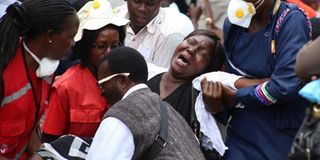Breaking News: At least 10 feared to have drowned in Makueni river
Involve local Somalis in war against terror

Kenya Red Cross officials and volunteers assist a relative of a Garissa University College student at Chiromo Mortuary in Nairobi on April 7, 2015. PHOTO | BILLY MUTAI |
What you need to know:
- By enlisting Kenyan Somalis, and letting them own the push, major strides would be made.
Controversial as it may sound, the war on Al-Shabaab cannot be won without involving local Somali community.
By enlisting Kenyan Somalis, and letting them own the push, major strides would be made. So far, this has failed because of the existing mistrust between the government and them. The locals feel victimised in general and those who have offered tip-offs to the police have been betrayed by the same government.
A number of chiefs have been killed by agents of the terror group after word leaked to the dreaded group that they were working with government.
Away from the limelight, leaders from North Eastern Kenya has been advising security agencies to involve members of the Somali community in the fight against the group.
Again, the war should never be reduced to producing of some list of financiers. I believe National Assembly Majority leader Aden Duale’s remarks to the effect that leaders from the region would give names of al-Shabaab sympathisers came because of the concern and pain he felt after the attacks in Garissa University where 148 people died.
He is free to present a list if at all he has any but I feel it would be unfair to use his position in government against him. He has been instrumental in leading the war on terrorism given the kind of grass root mobilisation he has done in the past.
The kind of failure already seen is largely attributable to our security forces because we are poor gatherers and consumers of the security intelligence. We could do better if we improved on this front.
The other day I was pained when the Interior Cabinet Secretary Major-General Joseph Nkaissery publicly announced that a security mop-up would commence in parts of Samburu and Turkana to deal with cattle-rustling. For a former military man, I thought he would be more stealth in his game plan but sadly, he chose the public gallery to do this.
Instead, he would have called the media conference to announce the success he had achieved in the region after the operation, not before. Tell me, would the local militia wait for the government forces to disarm them after the operation is made public beforehand? The effect of such inferior security approaches is that more than 80 per cent of our country’s landmass would continue to be at the mercy of warlords.
MANAGED TO INSTIL FEAR
I know al-Shabaab has managed to instil fear even among our police and the military, creating a false impression that they can successfully stage a fight.
For us to win the war, we must urgently change tact. For instance, closing Garissa University after the April massacre was not wise. Strategically, it has served to embolden the murderous group who would most likely see this as a form of retreat.
My reading of pragmatic political governance tells me that the best form of defence lies in the offence. We therefore need not to retreat but instead take the war to their doorsteps and boost the security at the learning institutions there. This is what Ethiopia has done.
Also, telling us that you are putting up a wall between Kenya and Somalia only as a form of deterrence sounds juvenile. It is an ill-conceived idea by theorists and can only pass for a nursery school solution for a university problem.
With the porous borders and poor surveillance, I expect no milestone in this endeavour and I wish somebody listens to me because no single life should be lost again because of our inaction.
After all is said and done, devolution does not mean 47 different islands and so the onus is on the government to protect its people. But how does it enforce this in the current state of affairs? Concepts like the rule of law and due process only obtain in an orderly society. Security and order are two insuperable twins.




